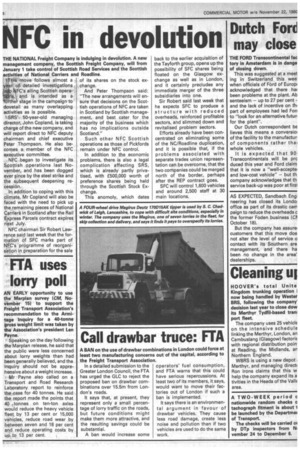NFC in devolution
Page 6

If you've noticed an error in this article please click here to report it so we can fix it.
THE NATIONAL Freight Company is indulging in devolution. A new management company, the Scottish Freight Company, will from January 1 take control of Scottish Road Services and the Scottish activities of National, Carriers and Roadline.
4This move follows almost a yer of detailed investigations , .
NFC's ailing Scottish opera
's,!: and is intended as a 'farther stage in the campaign to dovetail as many overlapping activities as is possible.
SRS' 50-year-old managing director, John Copland, is taking charge of the new company, and will report direct to NFC deputy chairman and chief executive Peter Thompson. He also becomes a member of the NEC executive committee.
NFC began to investigate its Scottish operations last November, and has been dogged ever since by the steel strike and the subsequent deepening recession.
In addition to coping with this climate, Mr Copland will also be faced with the need to pick up the remaining pieces of National Carriers in Scotland after the Rail Express Parcels contract expires next July.
NFC chairman Sir Robert Lawrence said last week that the formation of SFC marks part of NFC's programme of reorganisetion in preparation for the sale of its shares on the stock exchange.
And Peter Thompson said: "The new arrangements will ensure that decisions on the Scottish operations of NFC are taken in Scotland by Scottish management, and best cater for the majority of the business which has no implications outside Scotland."
Such other NEC Scottish operations as those of Pickfords remain under NFC control.
In addition to the economic problems, there is also a legal complication affecting SRS, which is already partly privatised, with £500,000 worth of preference shares being held through the Scottish Stock Exchange.
This anomoly, which dates
back to the earlier acquisition of the Tayforth group, opens up the possibility of SFC shares being floated on the Glasgow exchange as well as in London, and it certainly precludes any immediate merger of the three subsidiaries into one.
Sir Robert said last week that he expects SFC to produce a structure with reduced overheads, reinforced profitable sectors, and slimmed, down and revitalised problem sectors.
Efforts already have been concentrated on eliminating some of the NC/Roadline duplication, and it is possible that, if the problems associated with separate trades union representation can be overcome, that the two companies could be merged north of the border, perhaps after the REP contract goes.
SFC will control 1,600 vehicles and around 2,500 staff at 30 main locations.














































































































